EVENTS 
|
|
Monday, August 6
10:30 AM - 11:30 AM
NCRC Building 10,
Room G079
Tuesday, August 28
9:00 AM - 10:00 AM
University Hospital,
Room 2C224
Tuesday, August 28
10:00 AM - 11:00 AM
University Hospital,
Room 2C224
Wednesday, September 5
8:45 AM - 4:15 PM
Forum Hall,
Palmer Commons
Friday, September 7
3:00 PM - 5:00 PM
NCRC Building 520,
Room 1122
Tuesday, September 18
1:00 PM - 2:00 PM
University Hospital,
Room B1C111
Tuesday, September 18
2:00 PM - 3:00 PM
University Hospital,
Room B1C111
Friday, September 21 -
Friday, October 19
Thursday, September 27
5:30 PM - 8:00 PM
NCRC Building 300,
Room 376
Registration closes on August 24
Friday, October 5
8:00 AM - 11:30 AM
University Hospital,
Room
2C224
October 15 - 17
Poster abstracts due: August 15
Thursday, October 18
1:00 PM - 5:30 PM
BSRB Kahn Auditorium & Seminar Rooms ABC
Networking mixer to follow
|
RESEARCH NEWS 
|
QUICKLINKS 
|
|
 |
|
Training & Professional Development
|

Select Research Funding &
Award Opportunities
|
|
Bridging Support
|
Award
|
Deadline |
|
|
Wednesday,
August 15
|
Other Opportunities
| Award |
Deadline |
|
|
Tuesday,
September 4
|
|
|
Tuesday,
September 4
|
|
|
Tuesday,
September 11
|
|
|
Tuesday,
September 11
|
|
|
Monday,
September 24
|
Featured Foundation Grants
| Award |
Amount |
Deadline |
|
|
$200K
|
Friday,
August 31
|
|
|
$200K
|
Tuesday,
September 25
|
|
|
$50K
|
Sunday,
September 30
|
Visit the Michigan Medicine Corporate and Foundation Relations funding portal for more foundation funding opportunities.
|

A Message From Leadership
|
Medical School Office of Research Seeks a Faculty Director for the BRCF DNA Sequencing Core
|
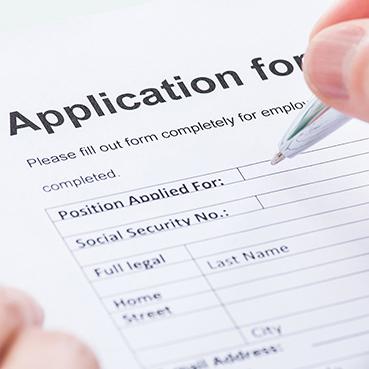
Dr. Lyons' position will be filled by two roles:
- Managing Director (100% Staff Scientist position) to manage the day-to-day operations of the Core.
- A Faculty Director (20% effort) who will partner and provide the managing director overall guidance to set the vision and strategic direction of the Core. Please note this is a renewable, two-year appointment.
The Faculty Director and Managing Director will jointly convene and leverage a core-specific faculty advisory committee that represents the diverse interests of our research enterprise to identify and prioritize the needs of the research community. As a key leadership position within the Medical School Office of Research, the Faculty Director will also represent the DNA Sequencing Core at Faculty Research Leadership meetings.
The Faculty Director must be institutionally minded, be an active user of the DNA Sequencing Core with the capability to understand investigators' broad sequencing needs, be able to see challenges as opportunities for improvement, and understand a service-oriented facility.
To Apply:
Applicants must hold a U-M faculty appointment, preferably within the Medical School, at the Associate Professor rank or above, be an active scientist, and demonstrate strong leadership skills. Knowledge of the Medical School and University research policies and procedures is desirable.
Nominations of potential candidates for the Faculty Director role can be sent to [email protected]; self-nominations are welcome and encouraged.
Applicants must submit their CV and a cover letter expressing their interest and qualifications addressed to the attention of Steven L. Kunkel, Ph.D., Senior Associate Dean for Research.
Please apply electronically to [email protected] with a single PDF by 5:00 PM on Friday, August 17, 2018.
|

Mi-TRAC for Life Sciences Proposals Due September 24
|
Mid-stage funding for biomedical commercialization
|
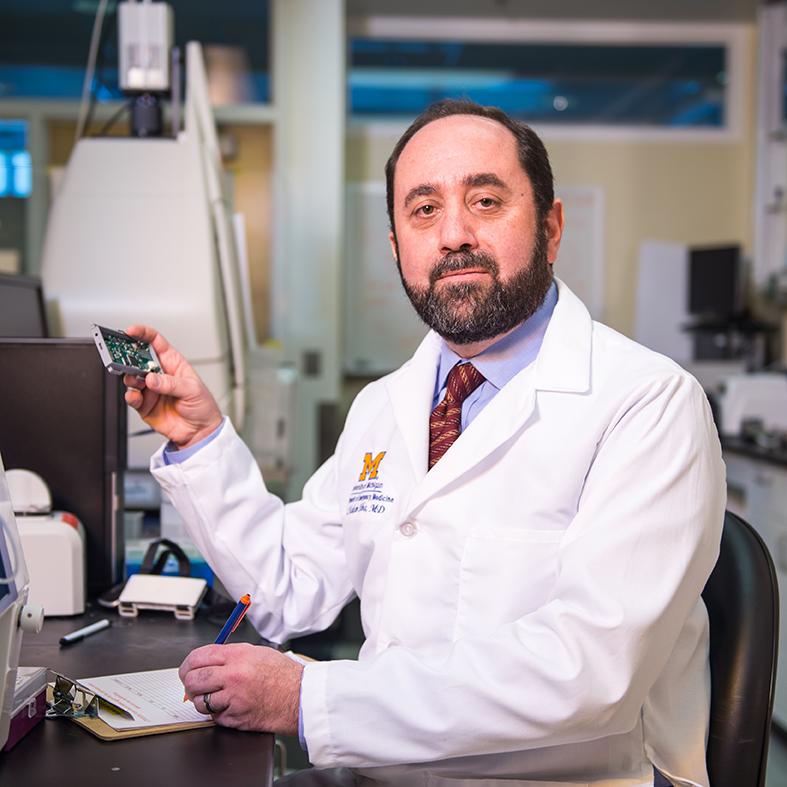
Have a hot concept in the realm of biomedical devices, diagnostics, therapeutics, or digital health/IT that would be a great candidate for commercialization?
Innovators from all schools at the University of Michigan, other institutions of higher education, non-profit research centers, and hospital systems across Michigan are eligible to submit projects for funding consideration.
|
Proposals are due on Monday, September 24
|
Questions?
Contact Bradley Martin, Ph.D., Sr. Director of Commercialization Programs, at
[email protected]
or call 734-936-8577.
|

Recent Michigan Medicine HIPAA Breaches
|

Please be advised that recent breaches have happened at Michigan Medicine that involved research subjects' identifiable patient information (Protected Health Information/PHI under HIPAA) stored on personally-owned laptops that were not encrypted and were subsequently lost or stolen.
Use of an unencrypted, personally-owned laptop to store research data involving PHI is a violation of UMHS policy, IRB approval for research, and federal regulations including HIPAA. Because of these incidents, Michigan Medicine is notifying more than 850 patients whose information was involved, along with the Media and the Federal Government.
REMINDER:
UMHS Policy 01-04-502, Security of Portable Electronic Devices and Removable Media requires encryption of all devices, including personally-owned laptops, that are used to store, transfer, or access sensitive clinical and research data.
In addition to laptops, this policy applies to all other devices:
- Smartphones
- Tablets
- Media players
- USB flash drives
- External disk drives
- Memory cards (SD cards)
- CDs, DVDs and other electronic magnetic or optical storage media
It is also the researcher's responsibility to store sensitive data in appropriate locations based on their research protocol as approved by the IRB.
If laptops are not approved to store sensitive research data per the IRB-approved research protocol, then DO NOT store sensitive data on a laptop, whether you own it or if it was issued to you by Michigan Medicine.
Violations of this policy result in disciplinary action, up to and including termination.
Enroll All Your Devices in AirWatch:
Enroll your smartphone, tablet, or personally-owned laptop in AirWatch if you use the device(s) to access or store any sensitive information. AirWatch provides the encryption and security controls that are necessary to ensure your device meets the requirements of UMHS Policy 01-04-502.
AirWatch is supported on multiple platforms, including iOS, Android, Mac, and Windows devices. See the
Knowledgebase for more information on supported platforms.
Need Help?
HITS Service Desk staff are available to help you with
AirWatch and other encryption-related questions.
|

Revised Policy: Institutional Conflicts of Interest (ICOI) in Research
|
|
An ICOI is where the university, as an institution, has a financial interest that has the potential to bias or appear to bias, research conducted by university employees or students.
As one example, when the university invests in a faculty start-up company that commercializes technology developed as a result of research at U-M and that start-up company, in turn, sponsors research at U-M, the university has a financial interest in the company that could potentially influence the conduct of the research.
Who identifies a potential ICOI?
Unlike individual conflicts of interest, where university employees disclose their relationships with external companies or organizations in M-Inform
, potential ICOI situations are
identified by
the university's central offices (e.g., Technology Transfer, University Development, ORSP) in the course of doing business. U-M's ICOI Committee reviews the potential institutional conflicts of interest to identify if an ICOI exists and to determine appropriate management. The ICOI Committee will also act in an advisory role in non-research related conflict of interest situations.
How does ICOI impact individual researchers?
Investigators whose research may be impacted by an ICOI will be contacted directly by the ICOI Committee. These investigators will be expected to review and take action on the ICOI management plan to reduce the potential bias. This may include disclosing (i.e., informing others about) the university's financial interest in the research to the study team, in publications, and/or in informed consent documentation.
|

Propofol to Be Handled As Controlled Substance Effective August 1
|
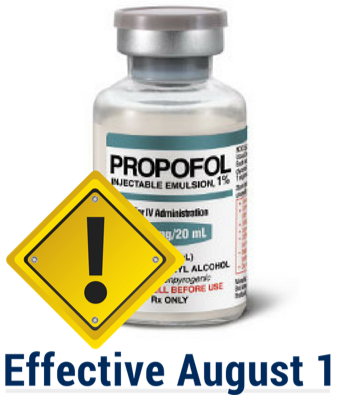 Effective August 1, 2018, propofol will be handled and stored in the same manner as controlled substances. This change is applicable to all animal and analytical researchers across campus.
Effective August 1, 2018, propofol will be handled and stored in the same manner as controlled substances. This change is applicable to all animal and analytical researchers across campus.
To address ongoing security concerns, this change in how propofol is handled and stored is being made institution-wide (including Michigan Medicine). Detailed instructions for the handling and storage of propofol in research can be found in the
Propofol SOP on the U-M Office of Research
Controlled Substances Monitoring Program webpage.
Those Principal Investigators who are using propofol for research, but are not already familiar with controlled substance security measures and record-keeping
processes must schedule a mandatory training session with the UMOR Controlled Substances Oversight Monitor. Training sessions should be scheduled as soon as possible in order to allow adequate preparation time leading up to the August 1 compliance deadline.
To schedule a training session, or if you have additional questions or concerns, please contact Kelli Christman, Controlled Substances Monitor, at
[email protected].
|

New Augmented Reality Game at Researchpalooza on August 8
|
Crack the code, win the prize, and share on social media!
|
|
Inspired by
Pokémon GO, the Zappar game exposes hidden interactive experiences by using your smartphone to scan any of the four Zapcodes randomly scattered throughout the Office of Research tables at Researchpalooza. All you have to do is download the free
Zappar app and look for the Zapcode Signs (example pictured above).
Each of the four tables with a Zapcode is assigned a letter of the alphabet. Simply unscramble the letters to reveal, and then submit, the secret code word. Then go to the Medical School Office of Research's big white tent and show staff the "You're a Winner" screen to win a fun Pop Socket for your phone!
And don't forget, we're social at the big event! Share your fun experiences on Facebook, Twitter, and Instagram using the hashtag
#researchpalooza. Also, make sure to check out our Snapchat filter that day!
Researchpalooza is the perfect opportunity for colleagues and friends to have a great time and meet, mingle, and learn about the 90+ exhibitors from labs and offices of the medical school and across campus.
Click here for an updated list of the exhibiting labs and offices.
|

|
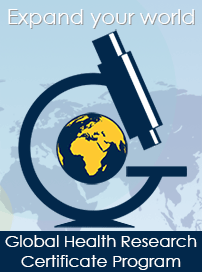
Entering its second year, the training program is open to any U-M faculty (M.D. or Ph.D.), fellow, resident, or Ph.D. candidate interested in applying their research in an international setting. The upcoming session kicks off in September.
|
Application Deadline: Friday, August 17, 2018
|
Through a combination of mentorship, monthly seminar events, and an international fieldwork experience, participants will gain the tools to develop and conduct their own research activities abroad. Topics explored include information sources and commonly used data sets in global health; mixed methods research practices; foreign health system structures and financing; building collaborative partnerships overseas and cultural sensitivity; and seeking extramural funding for international research.
For more information and to apply, visit the
website.
|

Biobanking Symposium & Workshops
|
Join the Central Biorepository on September 7
|
|
This year's theme is "Biospecimen Collections and Biobanking in the Era of Precision Medicine." The format will include two keynote speakers and four workshops covering several aspects of biobanking operations:
- Biobanking for Clinical and Translational Research
- Tissue Collections for Pathology Laboratory Based Biobanking
- Informed Consent of Participants
- The Importance of Quality Management in Biobanks
|
Friday, September 7
8:00 AM - 3:00 PM
NCRC Building 18, Dining Hall
|
The event is free to attend. Please register at glbrn.org. A select group of technology vendors will also be presenting their most recent innovative technologies for attendees. View the full agenda online.
The GLBRN has as a mission to foster biomedical research collaboration by enhancing access to biospecimens between institutions, improve on the practices of biospecimen procurement and biobanking, and to share through education the advances in biobanking and its contributions to biomedical science.
|

Study Team Members Invited to Share Knowledge, Experience, and Skills
|
Apply to serve on the MICHR Study Team Workforce Development Working Group
|

Members of the Working Group should support a competency-based approach to education and training. Expectations include:
- Reading and agreeing to the Working Group operational guidelines
- Participation in two 1.5 hour in-person meetings per year where members will share knowledge and their experiences as a member of a research study team or research support office
- Active participation in additional group tasks (beyond the two full-group meetings), which may involve email, sub-group meetings, and/or independent work.
Seeking representatives from the following three groups:
- Michigan Medicine: Study team members who are hired through departments in Michigan Medicine. This should include a mix of departments and a mix of research types. While a mix of roles is ideal, preference will be given for study coordinators, project managers, or early career faculty.
- Other university research departments: Study team members who are hired through departments external to Michigan Medicine. This should include a mix of departments and a mix of research types. While a mix of roles is ideal, preference will be given for study coordinators, project managers, or early career faculty.
- Research support offices: Members who have a full-time role in a research support office. This should include a mix of offices in Michigan Medicine and across the Ann Arbor campus.
|
Application Deadline: Monday, September 10, 2018
|
For more information and to apply, visit the webpage.
|

Learn How to Think Like a Grant Reviewer at Mock Study Section
|
Join MICHR on Thursday, September 27
|
|
As one of nine grant reviewers, you will discuss actual twelve-page K and R grants (already submitted in some version to the NIH). You will learn what happens behind the closed doors in a real K or R grant review. It's a true-to-life simulation guaranteed to raise your score.
This event is ideal for fellows and early career faculty who are writing career development and R01 grants. It simulates an NIH study section in every detail (including the work expected). Participants will be assigned a grant to review in either clinical and translational research or health services research.
Learning objectives:
- To review and critique the quality of a scientific grant application in a formal review meeting
- To apply the guidelines for peer review as developed by the NIH
- To discuss the common weaknesses of scientific grant proposals
|
Thursday, September 27
5:30 PM - 8:00 PM
NCRC Building 300, Room 376
Cost: $50 for U-M registrants; $65 for non-U-M registrants
|
|

Drive Your Research Forward With the Undergraduate Research Opportunity Program
|
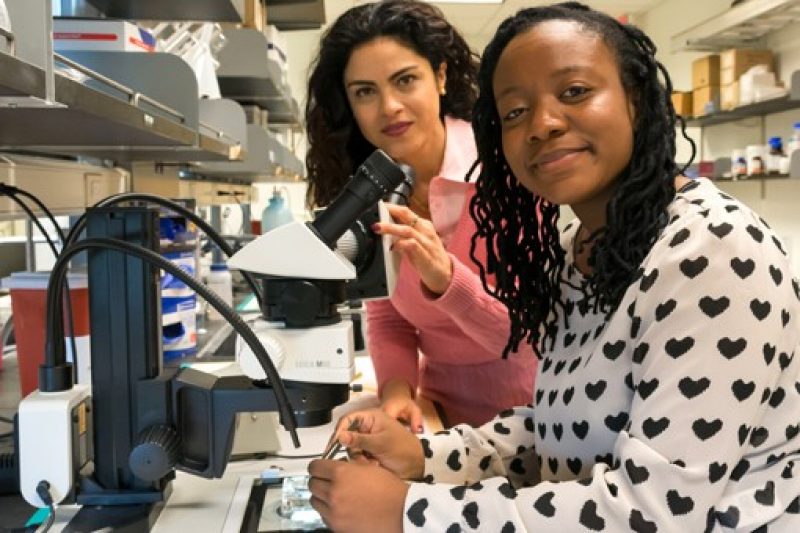 Would you like help getting a new research project started or expediting a project currently in progress? Do you want to gain experience mentoring undergraduates? Do you have a project you want to start but need someone to do some preliminary exploration?
Would you like help getting a new research project started or expediting a project currently in progress? Do you want to gain experience mentoring undergraduates? Do you have a project you want to start but need someone to do some preliminary exploration?
In September, over 1400 Undergraduate Research Opportunity Program (UROP) students will be on campus eager to get involved in research. Faculty, postdoctoral fellows, and research scientists are all eligible to be UROP research mentors.
Program highlights:
- UROP is open to first and second-year students and community college transfer students who may often work with you throughout their academic career at the University of Michigan. Beginning September 16th, you will have the opportunity to interview and select the students you wish to invite into your project.
- Students participate in the program the entire academic year from late September-May.
- UROP provides research skill building workshops including Refworks, Matlab, GIS, Endnote, SPSS, STATA, Keeping a Laboratory Notebook, etc.
- Supplementary research funding of $500-800 per student is available to cover research-related expenses.
|

Data Office Increases Charge Rate, DataDirect Now Offers Recruitment Mode
|
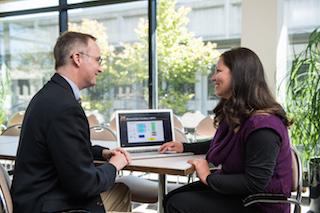
The Data Office is busier than ever working to serve all researchers' data needs.
The department has increased its recharge rate for custom data extracts. Data pulls performed by the Data Office analysts will now be $60/hour (previous rate: $50/hour). Any existing estimates or agreements will not be impacted.
Are you using DataDirect? It's now offering Recruitment Mode, which means that clinical researchers can view upcoming clinic schedules for more recruitment efforts. Expanding on the prerequisite Cohort and PHI modes, Recruitment Mode allows users the ability to define a cohort based on inclusion/exclusion criteria and then generate automated reports of upcoming appointments and contact information for that cohort. To use Recruitment Mode, you need to first be approved for DataDirect PHI use with an appropriate IRB approval for contacting patients. For steps on using Recruitment Mode, refer to the DataDirect User Guide.
Have you recently submitted any manuscripts in which you received data from DataDirect, EMERSE, or our Data Office analysts?
We want to know about it! Contact us at
|

Access Thousands of Cardiovascular Disease Biosamples
|
Available through the Central Biorepository
|
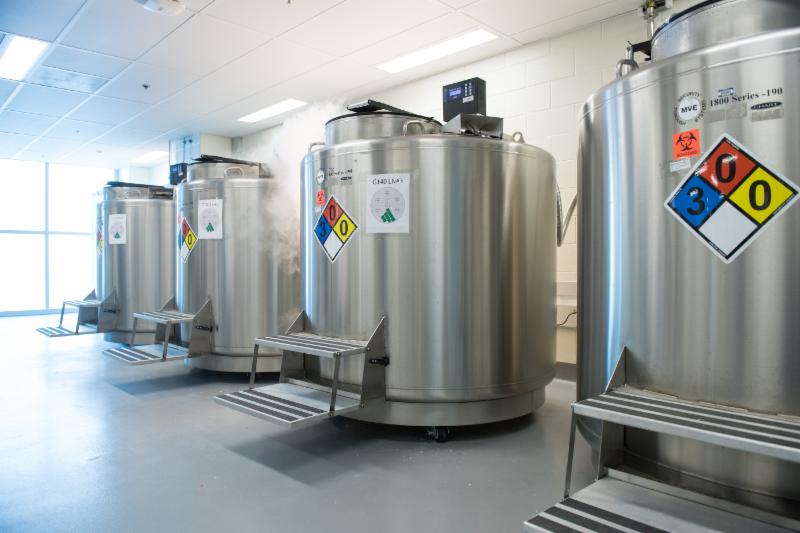
The Central Biorepository enables access to the thousands of available Cardiovascular Health Improvement Project (CHIP) biosamples from Michigan Medicine patients and offers secure linkage to laboratory and clinical data offered by the Data Office.
The study aims to learn more about individuals with aortic diseases and other cardiovascular-related conditions by collecting and analyzing biospecimens and clinical data from patients. By doing this, the team can learn more about the genetics behind cardiovascular disease, provide information to clinicians to facilitate precision medicine initiatives, and develop prevention strategies to delay disease onset.
Available biospecimens include aortic tissue samples, plasma, DNA, and serum. The study has more than 4,000 participants and the team is currently enrolling patients with aortic disease, a bicuspid aortic valve, connective tissue disorder, and heart failure. Comprehensive phenotype data are available.
CHIP is an active study of the Central Biorepository, a unit of the University of Michigan Medical School Office of Research, which facilitates discovery and improves healthcare outcomes by providing high-quality, highly annotated biospecimens donated for basic, clinical, and translational research.
Interested in accessing cardiovascular biospecimens for your study? Get started:
- Search the Cardiovascular Disease cohort on Data Office's self-serve tool, DataDirect.
- Complete and submit a CBR Use Proposal Form available online and send to [email protected].
- With IRB and oversight committee approval, datasets can be downloaded.
|

Research at Michigan Medicine
|
Alcohol-related cirrhosis deaths skyrocket in young adults
|

More Americans are dying from liver disease, and a Michigan Medicine study shows heavy drinking may be to blame.
Liver specialists Elliot Tapper, M.D., and Neehar Parikh, M.D., detail the surge in mortality from cirrhosis, the end stage of liver damage, and liver cancer in a new study published in the British Medical Journal.
Data collected from death certificates compiled by the Centers for Disease Control and Prevention show cirrhosis deaths rose by 65 percent between 1999-2016. Rates of liver cancer doubled to 11,073 deaths in 2016. Some conditions that cause liver trouble, like hepatitis C, have been falling. But other risk factors, including obesity, are on the rise.
Adults age 25-34 experienced the highest average annual increase in cirrhosis deaths. The increase was driven entirely by alcohol-related liver disease.
Tapper says he thinks that policy could play a role in addressing the problem. For instance, strategic taxation of alcoholic beverages could deter consumption, just as raising the taxes on cigarettes has been shown to reduce smoking. Minimum prices for units of alcohol can deter binge drinking and he also points to public health interventions, such as counseling, that help people quit drinking.
The good news is that liver function can be restored. Many patients can recover if they stop drinking soon enough.
For more information, read the full study online.
|

Future Featured Foundation Grants
for Biomedical Research
|

In addition to the quickly-approaching deadlines listed above, the following
opportunities are also available.
The Michigan Medicine Corporate and Foundation Relations team can assist in the funding process, including providing direct communication with the funding entity to obtain guidance on project appeal/applicability to the funder, providing examples of previously funded U-M proposals, and answering general faculty questions. For a wide range of Foundation and Corporate funding opportunities, please visit our website.
Please note: A faculty member's research administrator will serve as the liaison on all aspects of the internal application process. If you are unsure of whom to talk to, your department contact can be found here. If you pursue any grant opportunity featured in this edition of Research News, please contact your research administrator first to formulate a submission plan and timeline.
|
Award
|
Amount
|
Deadline
|
|
|
Various:
$300K
|
Tuesday,
October 2
|
|
|
$675K+
|
Monday,
October 15
|
|
|
$500K
each
|
Saturday,
December 15
|
Questions about these award opportunities should be directed to Joe Piffaretti in Michigan Medicine Corporate and Foundation Relations via email or phone at 734-763-1318.
If you are interested in receiving weekly funding announcements that include opportunities such as those listed above, please contact Joe Piffaretti to be added to the faculty/staff email circulation list.
|
Updates on Rigor & Reproducibility
|
Sharpening the Focus: Tips on Grant Proposal Preparation
|

By Jill Jividen, Ph.D., Assistant Director for Research Development, U-M Medical School Office of Research
(One in a
series
of tips published in UMMS Research News about writing proposals.)
There are clarifications forthcoming around
Scientific Premise, one of the four pillars of the 2016 Enhancing Reproducibility policy; this one addresses prior research (i.e., studies on which the proposed project is founded). A previous study, for example, might have failed to consider biological variables like sex, or might have had an inappropriate sample size. For grant applications due in January 2019, guide notices will specify use of the Significance section for describing strengths and weaknesses of prior research that serves as key support for the current proposal. In Approach, researchers should describe plans to address weaknesses in the rigor of previous work.
Additionally, NIH hopes to share examples of particularly strong Authentication of Key Resources plans and keep us updated on pilot programs to integrate rigorous experimental design and transparency in pre-doctoral training programs. The agency will continue to assess needs of researchers in meeting proposal guidelines toward robust scientific practice.
|
|
|